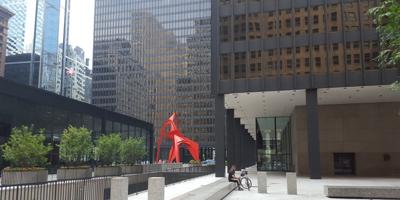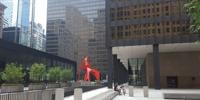
Dirksen Federal Courthouse, Chicago
As more of America's elite colleges and universities agree to pay out hundreds of millions of dollars in settlements amid a sprawling antitrust class action accusing them of conspiring to limit student financial aid, a federal judge has agreed to look into accusations now leveled against some of the lawyers leading that legal action for allegedly inflating their billing records to boost the fees they reap from those deals.
On July 28, U.S. District Judge Matthew F. Kennelly granted final approval to a settlement between Johns Hopkins University and a class of potentially tens of thousands of students.
Under that deal, JHU would agree to pay $18.5 million to settle the claims against it.
That deal is the latest approved after the court earlier approved a collection of 10 settlements with elite colleges and universities, collectively totaling $284 million. Those settlements include deals under which Northwestern University would pay $43.3 million and the University of Chicago would pay $13.5 million. Vanderbilt University has agreed to pay $55 million, the largest settlement to date.
The settlements all would resolve claims lodged in a class action that the schools allegedly colluded to limit financial aid awards for students.
The class action was launched in 2022 when 10 named student plaintiffs sued 17 private universities, accusing them of violating federal antitrust laws.
Defendants also included Brown University, Emory University, Yale, the California Institute of Technology, Columbia, Cornell, Dartmouth, Duke, Georgetown, Massachusetts Institute of Technology, Notre Dame, University of Pennsylvania and Rice.
The lawsuit was led by attorneys from the firms of Freedman Normand Friedland, of New York; Berger Montague, with offices in Philadelphia, Chicago and Washington, D.C.; and Gilbert Litigators and Counselors, also of New York.
In addition to the Johns Hopkins settlement, Kennelly also continues to consider a settlement with CalTech, worth another $16.75 million.
The CalTech and Johns Hopkins settlements were presented to the judge simultaneously in March.
As part of those settlements, attorneys from the Freedman Normand Friedland and Berger Montague firms presented a request for one-third of the combined funds for the two settlements, or about $11 million.
However, as Kennelly considered the new settlements, one of the attorneys for the plaintiffs, Peter Bach-y-Rita, of the Freedman Normand firm, of San Francisco, filed a letter to Judge Kennelly in the docket, asserting some of this fellow plaintiffs' counsel had potentially violated attorney ethics rules when submitting billing records to the court in support of their fee request.
In the June 19 letter, Bach-y-Rita said he had "attempted to resolve these concerns with my colleagues and co-counsel," but was "unable to do so." In the letter, Bach-y-Rita said, among other responses, the other attorneys allegedly told him they didn't believe those ethics rules, which require attorneys to accurately bill for their services, "apply to class actions."
Later, in open court, Bach-y-Rita elaborated further, telling the judge that his allegations were just "the tip of the iceberg," and that other plaintiffs' attorneys had perpetrated "a fraud on the court."
After that hearing, attorneys for the five universities remaining as a defendants in the legal action filed a motion urging the judge to pause proceedings for a while to allow them the chance to dig a little deeper into Bach-y-Rita's allegations.
In the July 1 motion, attorneys for M.I.T., Cornell, Notre Dame, Georgetown and Penn said the accusations, if true, bring into question the ability of the plaintiffs' lawyers to fairly represent the interests of the students in the class action, rather than their own.
They argued "fraudulent billing" by plaintiffs' lawyers could be enough to undo the class action altogether.
"Fraudulent billing is a serious ethical violation, and when such billing is submitted to a court for approval as part of a fee award, it must be viewed not only as an ethical matter but also as a fraud upon the court," the universities said. "Fraudulent billing is also an archetypal example of misconduct that 'casts serious doubt on [counsel’s] trustworthiness as representatives of the class.'"
Plaintiffs' lawyers have objected to that demand. In a response filed July 9, attorneys from the firms of Berger Montague and Freedman Normand said the universities' concern over their fee arrangements is based simply in a "strategic" effort to defeat the legal action.
"... Their goal was not to protect the class, but to weaponize the allegations for tactical leverage," the plaintiffs' lawyers said.
The response was not co-signed by Bach-y-Rita, despite his affiliation with Freedman Normand.
The plaintiffs' lawyers urged the judge to deny any move by the universities to use discovery to gather information about the plaintiffs' lawyers payment, fee and billing arrangements and what they may or may not have told their clients.
On July 28, however, Kennelly set a hearing for Aug. 8 to drill down further into Bach-y-Rita's claims.
In an order posted to the court docket, Kennelly said the in-person hearing in his Chicago courtroom would be limited to counsel only, including Bach-y-Rita and his counsel, as well as four attorneys of record for the plaintiffs and two attorneys for each of the five universities.
In the order, Kennelly said Bach-y-Rita "is to be prepared to testify regarding any contention on his part that false or inflated billing records were submitted to the Court," and to provide any supporting evidence he may have.
Attorneys who signed the brief opposing discovery into their billing practices include: Robert D. Gilbert, Elpidio Villareal, Robert S. Raymar, David S. Copeland and Natasha Zaslove, of Gilbert Litigators & Counselors, of New York; Edward J. Normand, Devin "Vel" Freedman, Richard Cipolla, Joseph Delich and Ivy Ngo, of Freedman Normand Friedland, of New York and Miami; and Eric L. Cramer, David Langer, Jeremy Gradwohl, Richard Schwartz, Daniel J. Walker, Robert E. Litan and Hope Brinn, of Berger Montague, of Philadelphia, Chicago and Washington, D.C.
The five universities are represented by attorneys from the firms of Wilmer Cutler Pickering Hale and Dorr, of New York and Washington, D.C.; Miller Shakman Levine & Feldman, of Chicago; Kirkland & Ellis, of New York, Washington, D.C., and Chicago; Mayer Brown, of Chicago; Freshfields US LLP, of Washington, D.C.; Goldman Ismail Tomaselli Brennan & Baum, of Chicago; Williams & Connolly, of Washington, D.C.; and Michael Best & Friedrich, of Chicago.


